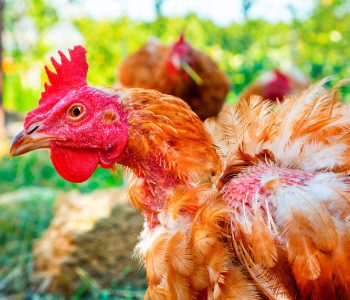Feather pecking and cannibalism are caused by a combination of genetic and environmental factors.
Among the environmental factors, nutrition and feeding behavior play a prominent role.
While nutritionists assume that feather pecking is caused by nutrient deficiencies or imbalances, ethologists look for causes that stem from impulses associated with feed intake.
The problem of cannibalism exists in hens, broilers, turkeys and other species of domestic poultry, such as quail, royal ducks and ostriches. Although debeaking is effective in regards to preventing this problem, it is no longer allowed in many countries as it goes against animal welfare
Feed effects
Oats appear to be the type of grain that reduces feather pecking the most, compared to barley and wheat (Wahlström et al., 1998).
However, in chickens, this positive effect depends on the genotype: some genetic lines respond positively to oats, while others do not.
When comparing barley and wheat, Brahamsson et al. (1996) found a better plumage condition in layers fed a high barley diet(25% barley/39% wheat) in contrast to a high in wheat diet(50% wheat/14% barley).
| Grains containing high amounts of fiber have been shown to have a positive effect on feather pecking and cannibalism. |
However, this effect is highly variable and it is subjected to interactions with the genotype and the environment.
Energy and protein levels in the diet
The level of metabolizable energy in the diet appears to have little direct effects on feather pecking and cannibalism. However, as the level of metabolic energy influences the regulation of feed intake, this can indirectly affect the level of pecking by increasing or reducing certain nutrient deficiencies.
A lack of animal protein has been considered one of the causes of feather pecking and cannibalism.
[register]
Richter and Hartung (2003) compared diets for layers containing 4% meat-and-bone meal and 4 different plant-based protein diets.
- There was a trend towards higher mortality in some of the plant-based protein diets.
- The plumage condition of layers fed 4% meat and bone meal was better than that of hens fed a diet based on plant raw materials.
Most poultry diets are highly concentrated in regards to their energy and protein levels. This allows an intake of large amounts of nutrients in a short time.
- The short amount of time required for feed consumption is considered a major cause of behavioral problems in farm animals.
- Under natural conditions, animals spend about 40 to 60% of the day in activities related to feeding (searching and ingesting).
- The time spent on feeding for animals in confinement is reduced to about 2 hours.
Inadequate supply of proteins and amino acids, mainly methionine and lysine, stimulate feather pecking and, in some cases, cannibalism.
The effects of arginine dietary inclusion regarding feather pecking, have not been thoroughly documented.
The beneficial effect of tryptophan on feather pecking in different species has been attributed to its function as a precursor of serotonin.
| Under natural conditions, animals spend about 40 to 60% of the day with activities related to feeding. In animals in confinement, the time dedicated to feeding is reduced to approximately 2 hours. |
Feeds that contain high amounts of fiber and are finely ground can reduce the risk of feather pecking.
- The effect of high-fiber diets on feather pecking is not only due to an increase in feeding time.
- Insoluble fiber has been found to increase the mean retention time in the anterior gastrointestinal (GI) tract while reducing retention time in the posterior GI tract (Hartini et al., 2003). The authors suggested that the increased filling of the anterior intestine in response to insoluble dietary fiber makes birds feel more satiated. Therefore, reducing the feather pecking stimulus as well as exploratory behavior (increased locomotor activity, pecking of the soil, etc.).
Sodium deficiency in diets increased feather pecking in many cases. The effect of other minerals and trace elements did not show consistent results.
- It is generally recognized that nutrient deficiencies increase exploratory behavior, which can be directed toward the feather cover of group mates.
Feed presentation
There has been steady trend towards the presentation of feed with coarse particles, especially granules and crumbs, which produce less feather pecking and cannibalism compared to finely ground particles. This effect is explained by the influence of feed shape and feeding time.
- Ground feed reduces the time required to ingest the feed, and therefore may not reduce pecking and exploration impulses.
- Pecking activity can also be directed towards the feathers of flock companions.
The protein content of feathers is highly indigestible. Therefore, feathers are not expected to contribute to the birds’ protein supply, especially when feed provides adequate levels of amino acids.
Feathers are similar to insoluble dietary fiber in that they increase the filling of the stomach and accelerate intestinal passage of feed.
Conclusions
There is a strong correlation between nutrition and feather pecking.
As amino acid and mineral(sodium) deficiencies increase, the risk of feather pecking in all poultry increases.
Nutrient supply above the known requirements for production does not clearly reduce feather pecking. On the other hand,the use of fiber rich diets appears to reduce feather pecking.
Although the risk of feather pecking can be reduced with proper nutrition, it cannot be avoided at 100%. Experiments with lines of laying hens selected for high feather pecking has shown that these birds have a special preference for feather consumption.
This particular affinity is considered the main cause of feather pecking in optimal feeding systems. Therefore, genetic selection of birds must be the next step to take once nutritional problems have been solved.
Source: This article was originally published is spanish in NutriNews Latam
[/register]
